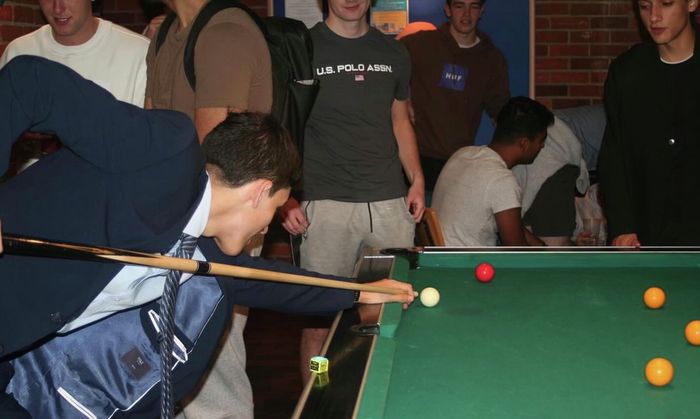‘Try’-ing times: An MMLer’s encounter with France’s Rugby World Cup
As the Rugby World Cup plays out on French soil, it arrives with the echoes of past sporting fiascos. Joe Mather asks whether Paris can change the narrative

Immersed in the heart of France, current third-year students studying the Modern and Medieval Languages Tripos are witnessing first-hand the highly anticipated Rugby World Cup, which, until last Sunday, saw the hosts as favourites to win. Fan zones can be found around the country in Toulouse, Bordeaux, Lyon, Saint-Étienne, and Paris, where 600,000 foreign visitors are expected to enter the country throughout the course of the seven-week tournament.
The stage is set
For the large contingent of MML students in Paris, myself included, we have been afforded the opportunity of the country’s largest fan zone at the Place de la Concorde with a capacity of 39,000 visitors. But to call Concorde a fan zone would be highly underselling it – it is a rugby village in the centre of Paris with two 84 sq metre screens, a mini rugby pitch, a wheelchair rugby pitch, a gift shop, numerous bars, traditional French cuisine in the form of renowned French restaurant Bouillon, and a stage to provide pre-match entertainment, all as the Eiffel Tower features as a backdrop.
A rousing rendition of La Marseillaise was the prelude to an immense game of rugby where Antoine Dupont’s men brought about the All Blacks first-ever defeat during a World Cup pool match, thanks to second half tries from winger Damian Penaud and replacement full back Melvyn Jaminet. Their 27-17 victory stirred a maelstrom of drunken celebrations from French supporters who serenaded the French team off the pitch to chants of “Allez les Bleus”.
Changing narratives
Speculation regarding France’s ability to hold large-scale sporting events arose after the fiasco of last year’s Champions League final between Liverpool and Real Madrid, where fake tickets and train strikes created a logistical nightmare outside the Stade de France. According to French minister of the interior governments, Gérald Darmanin, between 57% and 70% of tickets were fake. Supporters from both sides of the Champions League final found themselves mugged and robbed as they tried to leave. The Rugby World Cup allows France to quickly rewrite the narrative of poor logistical planning before the 2024 Summer Olympics, which will also be held in Paris.
An array of CCTV cameras have been installed at the Stade de France and the 2.2 million tickets for the competition have been made forgery-proof. At France’s opener against New Zealand there was a large contingent of police officers carrying machine guns at the Place de la Concorde rugby village, and the Préfecture de Police also placed a perimeter of security which surrounded the area and prevented traffic. The two closest metro stations, Concorde and Tuileries, were closed for over twelve hours.
An underwhelming sequel
In his speech at the opening ceremony of the tournament, French President Emmanuel Macron stated: “France is hoping to win this World Cup on the pitch but also in the hearts of everyone who has come to celebrate our shared passion.” Unfortunately, following the first game of the tournament the “passion” which Macron described has vanished from the capital. In terms of marketing and advertising, evidence of the Rugby World Cup in the city centre is rather lacklustre.
Furthermore, finding a cafe or a bar where the games are broadcast is a rarity, and in the small chance that you do find one, no one seems to care that the rugby is on. In some cases, TV channels were more interested in broadcasting the Tour de Luxembourg. On 17 September – which saw important games for England and Australia, against Japan and Fiji respectively – the rugby village was closed due to a logistical error on the Rugby World Cup website which had the wrong date for the fixtures. Returning to Place de la Concorde to watch England take on Argentina in their opening match the day after France’s historical win over New Zealand, the attendance was expected to be far from the 50,000 who entered on the previous night. But the attendance was so low and the atmosphere so sombre that people chose to sit on the floor to watch the game.
Perhaps a much better experience of the Rugby World Cup is being felt in the rugby heartland of France, the south, notably with the fan bases for clubs Toulouse, Toulon, Montpellier, and Perpignan. In Paris, the task of fostering a universal appeal to the game is still an enduring endeavour.
 Comment / Cambridge is a masterclass in nostalgia11 March 2025
Comment / Cambridge is a masterclass in nostalgia11 March 2025 News / Vet School saved?7 March 2025
News / Vet School saved?7 March 2025 News / Pro-Palestine supporters urge Cambridge to end injunction bid11 March 2025
News / Pro-Palestine supporters urge Cambridge to end injunction bid11 March 2025 News / Caius threatened with legal action after accommodation fiasco7 March 2025
News / Caius threatened with legal action after accommodation fiasco7 March 2025 News / University Library electronic legal deposit systems restored12 March 2025
News / University Library electronic legal deposit systems restored12 March 2025





